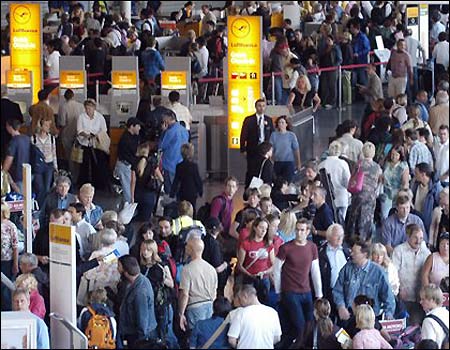BREAKING NEWS
August 11, 2006
A Brief Recovery and Now This
This was to be the summer the airlines were going to put 9/11 and its aftershocks firmly behind them.
And it seemed to be working: fares were up, planes were full — albeit to passengers’ discomfort — and the airlines were making money again. The industry just reported surprisingly strong second-quarter profit of $1.6 billion, its best showing in six years, after losing $40 billion since the 2001 terrorist attacks.
Now this.
The foiled terrorist plot in London that aimed at American carriers throws into doubt whether the airline industry will be able to continue its nascent recovery. Aviation experts said yesterday that it was too early to tell the lasting effects of the new threat, but they say the industry is unlikely to escape completely unscathed.
If travelers take fewer trips — out of fear, or an unwillingness to endure the frustrations of tighter security — then the airlines could see an end to what has been a very short flight to prosperity. The best the industry can hope for is that new security measures take effect with minimal fuss from passengers, and that travelers keep flying, meaning the crisis will pass with little damage beyond rattled nerves and a raft of canceled flights late in the summer travel season.
If travelers start avoiding the skies — staying at home or taking to the road instead — airlines may use two weapons to lure them back, namely fare cuts and offers of extra frequent-flier miles. They have used both before in times of financial difficulties and security concerns, like the period after the September 2001 attacks and after filing for bankruptcy, as six major airlines have done this decade.
“Anything that is discouraging to travel, all other things being equal, will put downward pressure on fares,” said Bob Harrell, an industry consultant in New York. Fare cuts would clearly hurt the industry’s thin profits.
Anthony Sabino, a professor of law and business at St. John’s University, said travelers have “learned to live’’ with the prospect of terrorism.
He predicted that demand for trans-Atlantic travel would rebound quickly from this week’s disruptions. “Expect some frayed tempers but no serious dropoff in bookings,’’ he said.
The New York Times |
| April 2007 |
| S |
M |
T |
W |
T |
F |
S |
|
1
|
2
|
3
|
4
|
5
|
6
|
7
|
|
8
|
9
|
10
|
11
|
12
|
13
|
14
|
|
15
|
16
|
17
|
18
|
19
|
20
|
21
|
|
22
|
23
|
24
|
25
|
26
|
27
|
28
|
|
29
|
30
|
|
|
|
|
|
|
|
 |
|
« Previous |
Main Page
| Next »
|
Fear Strikes Out; The Stock Market Does Likewise
By: Pete Kendall, August 11, 2006 |
While buying into an atmosphere of fear is generally advisable, the Wave Principle explains that there is a point, in the middle of a bear market impulse wave, when this is a bad idea. Many will conquer their fear and be locked in for the duration of the bear market. When the headlines finally say, “Go ahead and panic,” a bottom will be at hand.
The Elliott Wave Financial Forecast, August 2006 |

When stocks quickly rebounded from the July 7, 2005 bombings, The Wall Street Journal immediately noted that the market was "getting more resilient to terrorist attacks." But EWFF commented, “Investors are getting bolder than even as the terrorists do likewise. This kind of complacency is not a signal of underlying strength.” The Dow Jones Industrial Average was up 5.2% by the end of July and 12% through its May 8 peak, but the response to the latest terrorist effort reveals the that the underlying weakness EWFF referred to last July is getting stronger still. The decline in response to last year’s London bombings was followed by a two-day 2.8% rally from a low of 10,175, which has yet to be broken (on a closing basis). In the wake of yesterday's liquid-airline bomb scare, the Dow rallied once again. But this time it bounced to a gain of less than 1%. And the initial low produced by the event was already taken out this afternoon. Once again, the snap back rally contributed to an overriding belief in the market's immunity to terror. Investors are “getting used to these events,” said an investment strategist on CNBC. “These are large economies and it doesn’t really have an impact.”
 When the trend is up, socionomics says stock prices will find their way around and/or through events of this type. Stocks love to use tremors like the shiver of collective fear surrounding yesterday’s bomb plot news as a spring board to higher levels. But the muted rebound points squarely to a trend in the opposite direction. The NY Times article at left is a great example of a third wave psychology taking hold. On the one hand, evidence of a “recovery” that has run its course is plain, but the bottom line is that we should “expect no serious drop off in bookings.” The tip-off to a plunge that extends way beyond the demand for trans-Atlantic flights is that investors, like travelers, have “learned to live” with the turbulence. Such complacency in the face of burgeoning manifestations of delcine (like the tons of liquids confiscated at airports across the country yesterday) is a sure sign of a renewed downtrend, not an upside break. As EWFF noted in August (see Additional References below) this is one moment when fear can be a useful emotion, “at least to those that listen to it and sell.” When the trend is up, socionomics says stock prices will find their way around and/or through events of this type. Stocks love to use tremors like the shiver of collective fear surrounding yesterday’s bomb plot news as a spring board to higher levels. But the muted rebound points squarely to a trend in the opposite direction. The NY Times article at left is a great example of a third wave psychology taking hold. On the one hand, evidence of a “recovery” that has run its course is plain, but the bottom line is that we should “expect no serious drop off in bookings.” The tip-off to a plunge that extends way beyond the demand for trans-Atlantic flights is that investors, like travelers, have “learned to live” with the turbulence. Such complacency in the face of burgeoning manifestations of delcine (like the tons of liquids confiscated at airports across the country yesterday) is a sure sign of a renewed downtrend, not an upside break. As EWFF noted in August (see Additional References below) this is one moment when fear can be a useful emotion, “at least to those that listen to it and sell.”
|
|
|
Additional References
August 2005, EWFF
Whatever You Do, DON’T PANIC!
In the wake of the London subway bombing. The FTSE, an index of 100 of the most highly capitalized companies on the London Stock Exchange, experienced a one-day sell-off that was quickly retraced. “Investors Have Learned Not To Panic,” proclaimed a USA Today headline. “If historical trends are any guide,” on the day of the blast Bloomberg reported, “The impact on the U.S. stock market may not last long.” “I thought, hmmm, time to buy,” said Fox News’ top anchorman. This attitude is the perfect set-up for a sustained decline; no matter how bad the news gets, or even because it’s so bad, investors have become conditioned to see the sunny-side of the stock market.
EWFF has shown how the neo-cortexes of high-level researchers continually find ways to intellectualize the sentiment of mania-era investors. A new study of brain-damaged investors in the journal, Psychological Sciences, proposes that individuals with an impaired ability to experience emotion are better at making financial decisions. It’s great to see this type of research. The focus on emotion is a clear advance toward the core issues of finance and socionomics. But there’s a more immediate message in the media’s coverage of the study. According to the headlines, “Investing and Emotion Are a Bad Mix” and “A Brain Damaged Investor Is a Smart Investor.” The New York Post somehow interpreted the findings to mean, “more risks translate into more rewards.” Buried deep in just one story is the revelation that the damaged participants only outperformed in a simple coin-tossing experiment. In more complex settings, they did not fair so well; in fact, “three of four experienced personal bankruptcy.” Real world experience exposes the flaw in the media’s interpretation. The best way to combat emotional. Based on this approach, the importance of the study is not what it says, but the press’ infatuation with it. While buying into an atmosphere of fear is generally advisable, the Wave Principle explains that there is a point, in the middle of a bear market impulse wave, when this is a bad idea. In third wave declines, fear can be a useful thing. At least, it is to those that listen to it and sell. These studies are further testimony to the ingenuity of social mood. With Primary wave 3 pending, papers ranging from The Wall Street Journal to MaineToday and The Hindu, India’s national newspaper, are focused on bolstering the conviction of investors. Many will conquer their fear and be locked in for the duration of the bear market. When the headlines finally say, “Go ahead and panic,” a bottom will be at hand. |
|
Post a comment
|
|
|
 |
| RECENT ARTICLES |
 |
April 16, 2007
Does Imus Cancellation Radio a Bear Market Signal?
read more |
April 12, 2007
One Small Coffee Shop Uprising for Starbucks, a Grande Leap for Labor
read more |
April 11, 2007
Dazzling Finish: Cars Bring Once-Boring Shades To Life
read more |
April 10, 2007
T in T-Line Stands for Top
read more |
April 5, 2007
The Fight for a Free Vermont? Must be a Big, Big Turn
read more |
|
|
| ARTICLE COMMENTS |
 |
|
|
|
|
